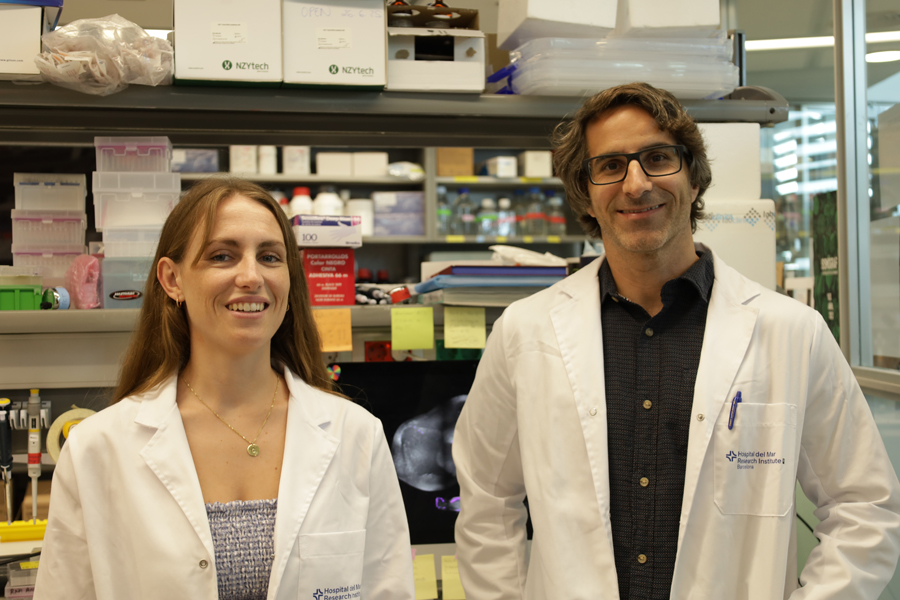
10/07/2025 - Press release
A study led by the Hospital del Mar Research Institute, with participation from the Oncology and Pathology Departments at Hospital del Mar, together with researchers from GEICAM, the Spanish Breast Cancer Research Group, points to a new approach to stopping breast cancer metastasis at the micrometastasis stage, when the first cells arrive at other organs, thereby preventing further disease progression. Published in Cancer Cell, the study has identified the role of the TIM-3 protein in the most aggressive metastasis-initiating cells-the seeds of metastasis. In these cells, TIM-3 enables tumor cells to suppress the immune system upon reaching distant organs, thus ensuring their survival at a critical time. This makes the arrival stage a unique therapeutic opportunity and positions TIM-3 as a highly specific therapeutic target for this precise phase of the disease.
This stage, when cancer cells reach a new organ, is critical but poorly understood, as there are no clinical signs or existing technologies to study it. The research team used a mouse model to investigate this process and describe the key role of TIM-3 in the survival of the first tumor cells that colonize affected organs. "This is a vulnerable stage of the disease, involving only a few cells. If we understand what happens and can eradicate them, we have a major opportunity to prevent clinical metastasis, which is the dangerous phase of the disease", explains Dr. Toni Celià-Terrassa, lead author of the study and researcher with the Cancer Stem Cells and Metastasis Dynamics Research Group and a member of GEICAM. This is the first time TIM-3's function has been linked to cancer cells in this way.

Catalina Rozalén i Toni Celià-Terrassa.
Protecting Tumor Cells-The Seeds of Metastasis
Tumor cells that survive the journey from the breast to other organs use TIM-3 to evade immune system attacks. By doing so, they reprogram the immune environment of the new organ to avoid immune detection and destruction. This allows them to survive and later proliferate, initiating the metastatic process, as the researchers observed in cells from various types of breast cancer that had metastasized to the liver. Using a patient cohort from Hospital del Mar, the researchers also found that those with high levels of TIM-3 in their tumors had a greater risk of metastasis and poorer prognosis. "Patients with TIM-3-positive primary tumors have a higher risk of recurrence and metastasis", notes Dr. Catalina Rozalén, predoctoral researcher at the Hospital del Mar Research Institute. Samples from patients in the GEICAM clinical trial (ConvertHER) also confirmed an enrichment of TIM-3-positive tumor cells in metastatic sites compared to the primary breast tumors.
This opens the possibility of using existing drugs that block TIM-3 to prevent the formation of new tumors. "Having tools for these high-risk patients, such as those who are TIM-3 positive, could allow us to offer anti-TIM-3 therapy after surgery to prevent relapse and metastasis", says Dr. Celià-Terrassa. This preclinical study indicates that the treatment should be applied before metastasis appears, as the disease becomes harder to control once metastasis has developed, and TIM-3 loses its relevance. However, proper clinical trials must first be conducted to validate the use of existing treatments that inhibit this protein in TIM-3-expressing cells, both before and after surgery.
"This study reveals a mechanism and specific target to attack metastasis at the micrometastasis stage in breast cancer-before it can even be detected", adds Dr. Joan Albanell, Head of the Oncology Department at Hospital del Mar and researcher at its research institute, GEICAM, and the CIBERONC cancer research network. "Blocking TIM-3 may allow us to achieve this, but much more research and appropriately designed clinical trials are still needed".
The study was supported by grants from the FERO Foundation (FEROMANGO, ref PFERO2020.2), AECC LAB (LABAE190007CELI), the "la Caixa" Foundation (HR23-00392), and the 2021 Chiara Giorgetti Award from the Metastatic Breast Cancer Association. It was also funded by the Worldwide Cancer Research charity (grant 20-0156), the Government of Catalonia (SGR-22 00037), and the Carlos III Health Institute-FSE (PI21/00020; CPII22/00001).
Reference Article
Rozalén et al., TIM3+ breast cancer cells license immune evasion during micrometastasis outbreak, Cancer Cell (2025), https://doi.org/10.1016/j.ccell.2025.06.015
© Institut Hospital del Mar
d'Investigacions MèdiquesLegal Notice and Privacy Policy | Cookie Policy | Site Index | Accessibility | Find Us | Contact